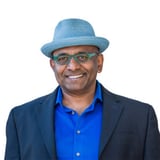Summary
Panelists including Nadi, Amy, Katie, Ricardo, and others explored how researchers are adapting their methods to the changing dynamics between participants, researchers, and organizations. Nadi emphasized the importance of an open mind and mixed methods to uncover insights and critique tools used. Amy highlighted the need to say yes to new methods, running pilots, and staying up-to-date with emerging tools, while managing client demands. Ricardo noted that switching methods comes when existing tools can’t answer key research questions or have biases and shared inspiration from conferences. The group also discussed participatory methods, experimental designs, and the redemption of focus groups. Integrating qualitative and quantitative data and using live stories helped keep the participant experience front and center for stakeholders. Amy and others shared balancing faster, lighter studies with deeper, longer-term academic research to achieve organizational buy-in. Challenges in dealing with stakeholders who have predetermined solutions were discussed, with advice to align on shared goals and pick battles wisely to maintain research objectivity and impact. Concepts like right-sizing research (Ricardo, Nadi), systems thinking, and Lean Research principles were introduced to respect communities and strategically influence organizations. Finally, panelists recommended mentoring, community engagement, offering simple tools, and gradual experimentation to upskill researchers and colleagues new to the craft. Megan shared work on a research method playbook with a quadrant guiding new practitioners on when and how to try methods safely. The conversation underscored that research is a dynamic craft blending strategy, empathy, experimentation, and organizational navigation.
Key Insights
-
•
Switching to a new research method often occurs when current methods cannot adequately answer the research question or have inherent biases, as Ricardo explained.
-
•
A mixed-methods and cross-functional approach allows researchers to address gaps one tool alone cannot fill, advocated by Nadi.
-
•
Leaders like Amy encourage saying yes to team experimentation with novel tools and running pilots to evolve the research toolkit.
-
•
Participatory and experimental methods are gaining renewed interest, with attempts to redeem sometimes maligned methods like focus groups.
-
•
Combining qualitative data such as video and quotes with quantitative findings helps keep participant experiences vivid for stakeholders.
-
•
Right-sizing research—both in participant group size and project scope—is critical to respect community burden and project constraints, as emphasized by Ricardo and Nadi.
-
•
Balancing fast, lighter UX studies with longer academic or in-depth research enables continuous insight delivery and organizational patience for complexity, shared by Amy.
-
•
Navigating stakeholder resistance requires aligning on shared organizational goals, choosing battles carefully, and emphasizing research objectivity, as experienced by the panelists.
-
•
Lean Research principles focusing on respect, relevance, and appropriate scale offer frameworks for conducting equitable and community-sensitive research.
-
•
Upskilling less experienced researchers benefits from mentorship, community involvement, sharing simple tools and templates, and introducing safe spaces to experiment with methods.
Notable Quotes
"Tools don't matter as much as the desire to learn and ask why things keep happening the way they do."
"We say yes when teammates are curious to try new methods and run pilots to see what works and what could improve."
"When surveys measure attitude but not behavior, it's time to try methods like conjoint analysis that reduce bias."
"Focus groups have been called a curse, but I'm giving them a second chance to see if there’s something positive there."
"Combining numbers with rich participant videos and quotes really brings the user to life for stakeholders."
"Right sizing research respects communities by matching the scope to what participants can reasonably engage with."
"Slowing down research creates equitable spaces where minority and marginalized voices can be meaningfully included."
"You have to pick your battles with stakeholders—fight the ones that really matter and let smaller issues slide."
"Use systems thinking to connect insights and show how research impacts organizational strategy holistically."
"Giving someone a tool to try a method in an hour can either inspire them or clearly show it's not a fit."
Or choose a question:
















More Videos

"People just don't get that the design and the process is fundamental."
Ian JohnsonLatent Scope: Finding structure in unstructured data
June 11, 2025

"Diverse teams build diverse products that work for more people."
Sam ProulxAccessibility: An Opportunity to Innovate
September 8, 2022

"Integrating psychology into product strategy isn't optional; it's essential for success."
Prayag Narula Hannah HudsonEmpowering Designers to do Good Research
March 11, 2022

"Patient opportunism means most of the time having the current at your back and only occasionally angling directly against it to avoid burnout."
John CutlerOxbows, Rivers, and Estuaries: How to navigate the currents of change (without burning out)
December 3, 2024

"Diversity means who is in the room, equity asks who wants to or should be in the room but isn’t, and inclusion asks have everybody’s ideas been heard."
Anna Avrekh Amy Jiménez Márquez Morgan C. Ramsey Catarina TsangDiversity In and For Design: Building Conscious Diversity in Design and Research
June 9, 2021

"Talking in first person increases empathy and leads to better design outcomes."
Noz UrbinaRapid AI-powered UX (RAUX): A framework for empowering human designers
May 1, 2025

"The way we build software now is fundamentally different; it's just easier to write code using platforms and microservices."
Greg PetroffEverything is About to Change: Software as Material
June 8, 2016

"All of these things are connected and when they become too disconnected, it’s problematic."
Andy Polaine Lavrans LøvlieWhat is the role of service design in product-led organizations?
December 3, 2024

"Your impact depends on strategic goals and context; without clarity, you won’t have the maximum impact."
Patrizia BertiniDesignOps + KPIs = Measure your Impact!
January 8, 2024
Latest Books All books
Dig deeper with the Rosenbot
How does Mary Lynn describe the effect of user interface changes on elderly users, through her personal observations?
What are de-risking sessions in service design and how do they help prepare stakeholders for co-creation?
What role does precise layer naming play in communicating design intent to AI?




















